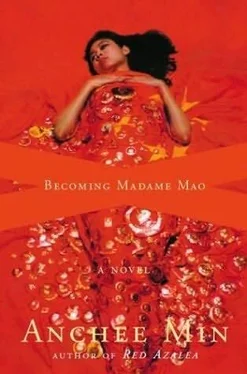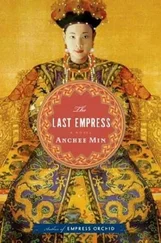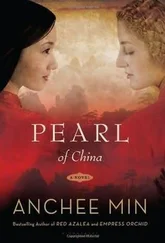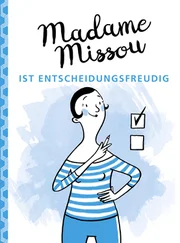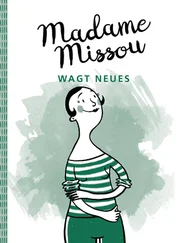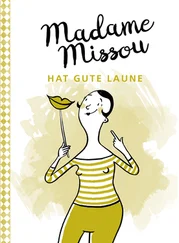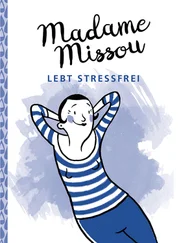Anchee Min - Becoming Madame Mao
Здесь есть возможность читать онлайн «Anchee Min - Becoming Madame Mao» весь текст электронной книги совершенно бесплатно (целиком полную версию без сокращений). В некоторых случаях можно слушать аудио, скачать через торрент в формате fb2 и присутствует краткое содержание. Жанр: Современная проза, на английском языке. Описание произведения, (предисловие) а так же отзывы посетителей доступны на портале библиотеки ЛибКат.
- Название:Becoming Madame Mao
- Автор:
- Жанр:
- Год:неизвестен
- ISBN:нет данных
- Рейтинг книги:4 / 5. Голосов: 1
-
Избранное:Добавить в избранное
- Отзывы:
-
Ваша оценка:
- 80
- 1
- 2
- 3
- 4
- 5
Becoming Madame Mao: краткое содержание, описание и аннотация
Предлагаем к чтению аннотацию, описание, краткое содержание или предисловие (зависит от того, что написал сам автор книги «Becoming Madame Mao»). Если вы не нашли необходимую информацию о книге — напишите в комментариях, мы постараемся отыскать её.
Becoming Madame Mao — читать онлайн бесплатно полную книгу (весь текст) целиком
Ниже представлен текст книги, разбитый по страницам. Система сохранения места последней прочитанной страницы, позволяет с удобством читать онлайн бесплатно книгу «Becoming Madame Mao», без необходимости каждый раз заново искать на чём Вы остановились. Поставьте закладку, и сможете в любой момент перейти на страницу, на которой закончили чтение.
Интервал:
Закладка:
In the process of recreating herself, she studies Chun-qiao's writing and recites his lines at public rallies. In May she takes a trip back to Beijing to check on Mao.
My husband is not in. He has gone south and has disappeared in the beautiful landscape of the West Lake. When I send his secretary a telegram asking for an appointment to meet and update him with my progress, he sends me a poem about the famous lake as a reply.
Years ago I have seen the picture of this
I didn't believe such beauty existed under heaven
Today I am passing through the lake
I conclude that the picture needs work
I feel that he may finally be ready to reopen his heart to me. I can never forget the poem he sent to Fairlynn and how much it hurt me. The virgins I can forgive. Yes, I resented him, but I never hated him. Even in my worst times I never wished him overthrown. God makes strange twists. Here he is, put in front of me to be helped. I have never been superstitious until now.
We are floating on the West Lake. It is a golden autumn. Reeds are thick and the cattails are out. The dike is lined with hanging willows. Parts of the lake are covered by lotus leaves. Connected to the shore by a bridge are pavilions of various styles built throughout the dynasties. The place has intricate rocks and is surrounded with poplars, peach and apricot trees. The famous Broken Bridge is made of white marble and granite, has a thin arched beltlike body.
There is no one else but the two of us.
Mao seems absorbed by the beauty. After a while he raises his chin to feel the sun on his face.
My memories are rushing back to me. The Yenan days and earlier. I am in tears. It is not for love but for what I have endured. The way I have once again rescued myself. The triumph of my will and my refusal to give up.
Did I tell you how I first got to know the West Lake? Mao suddenly speaks, eyes focused on a faroff pavilion. It was from a painted ceramic jar of poor quality brought to me by an elderly relative who had visited the place. The print on the jar was a map of the highlights of the lake. The water, trees, pavilions, temples, bridges and galleries. They were all clearly illustrated and accompanied by elegant titles. As a country boy I had little chance to encounter pictures so I took the jar to my room and studied it. Over the years I became so familiar with the scenes that they entered my dreams. When I visited the lake later on as a grown man I felt that it was a place I knew very well. It was like reentering my old dreams.
What? Does anybody dare not to listen to Chairman Mao? Chun-qiao's voice is filled with shock.
Jiang Ching rocks her chin as her tone becomes mysterious. I have Chairman Mao's full support to counterattack. She repeats the phrase as if she enjoys hearing the sound of it.
Full support! Chun-qiao exhales and claps his hands.
Here is my analysis of the situation, Jiang Ching goes on. Hairui Dismissed from Office is the key.
Chun-qiao sits back and combs his hair with his fingers. For you, Madame Mao, I'm willing to soak my pen with the juice of my brain.
She offers her hand for him to shake and then gently whispers into his ear: Soon the seats of the Politburo will be vacant and someone has to fill them up.
I don't drink, but today I want to show that I put my life in your hands. Come on, Chun-qiao, bottoms up.
We drink mai tais. It is past midnight. Our spirits are still high. We are finalizing the details of our plan. We are picking partners for the job.
Chun-qiao suggests his disciple Yiao Wen-yuan, who is the head of the Bureau of Propaganda in Shanghai. I have been paying attention to this man. He began to show his political talent during the antirightist movement. He is known for his criticism of Ba-jin's book Humanity. He is a heavy-duty weapon. People call him "the Golden Stick." His pen has put down many unshakable figures.
Good! We need golden sticks, I reply. Iron sticks and steel sticks. Our rivals are tigers with steel teeth.
Her next meeting with Mao sets history in motion.
November 10,1965. The curtain of the epic of the Great Proletarian Cultural Revolution lifts. It is quiet in the beginning, like the changing of the tides. The sound pushes in from a distance. After eight months of round-the-clock preparation, Jiang Ching, Chun-qiao and Yiao complete their draft entitled "On the Play Hairui Dismissed from Office. "
Mao reviews and revises the draft. A week later it appears in the Shanghai Wen-hui.
No one, from the Politburo to the congress, takes the article seriously. No one talks about it. No other paper reprints it. Like a rock thrown in a dry well, there is not a sound.
Jiang Ching enters Mao's study the nineteenth day after the publication. She tries to hide her excitement.
The resistance is obvious, she begins. Her voice is tightly controlled. It is an organized silence.
My husband turns toward the window and looks out. Zhong-nan-hai Lake is bathed in bright moonlight. The sea of trees is draped with silver rays. The shadows are velvet black. Not far in the distance, among the mists of fog, stand the pavilions of Yintai and Phoenix where every bit of grass, wood, brick and tile tells a story.
It is here Emperor Guang-xu was held hostage by the empress dowager. Mao speaks suddenly as he always does. The first vice president of the republic of China, Li Hong-yuan, was under house arrest on the same spot. Do you think they would dare?
We are all set to go, Chairman. Your health is the nation's fortune.
Have you printed the article as a handbook? Mao asks.
I have, but the bookstores in Beijing are uninterested. Only three thousand copies have been reluctantly stocked-compared to Vice Chairman Liu's On a Communist's Self-Cultivation, which has sold six million.
Did you relay the situation to the head of the Cultural Bureau, Lu Din-yi?
I did. His comment was "It is an academic issue."
Mao gets up and spits tea leaves from his mouth. Down with the Cultural Bureau and the Beijing City Committee! Let's stir the country. Tell the masses to shake the enemy's boats. The revolution must be renewed.
Your order has been placed.
The first couple of China utilize their power to its full capacity. Through the media Mao launches the movement. Let the Cultural Revolution he a soul-purifying process, the papers quote Mao. The old order has to he abandoned. A foot worker should be able to enter an opera hall free of charge; a sick son of a peasant should receive the same medical care as his provincial governor; an orphan should be able to obtain the highest education; and elders, the handicapped and the disabled should receive free public health care.
In a few months, creating chaos becomes a way of life. Looting is not only encouraged, but called an act to "help one depart from evil seduction." To follow Mao's teaching becomes a ritual practice, a new religion. In Madame Mao's twenty-four-hour propaganda there is nothing left of Mao but Buddha himself.
Behind the thick walls of the Forbidden City, Mao designs slogans to inspire the masses. Like an emperor he issues edicts. Today, "Everyone is equal in front of the truth," and tomorrow, "Welcome the soldiers to take over the leadership of the schools." The governors and mayors-especially the mayor of Beijing, Peng Zhen, and the head of the Cultural Bureau, Lu Din-yi, are disoriented. Yet Mao forces them to lead in the name of the Politburo. In the meantime, Kang Sheng is assigned by Mao to monitor the mayor's performance.
Jiang Ching is sent to "go around and light fires."
You can afford to make messes, Kang Sheng tells her. If something goes wrong, Mao will always back you up. My situation is different. I have no one to back me up. I must be careful.
Читать дальшеИнтервал:
Закладка:
Похожие книги на «Becoming Madame Mao»
Представляем Вашему вниманию похожие книги на «Becoming Madame Mao» списком для выбора. Мы отобрали схожую по названию и смыслу литературу в надежде предоставить читателям больше вариантов отыскать новые, интересные, ещё непрочитанные произведения.
Обсуждение, отзывы о книге «Becoming Madame Mao» и просто собственные мнения читателей. Оставьте ваши комментарии, напишите, что Вы думаете о произведении, его смысле или главных героях. Укажите что конкретно понравилось, а что нет, и почему Вы так считаете.
